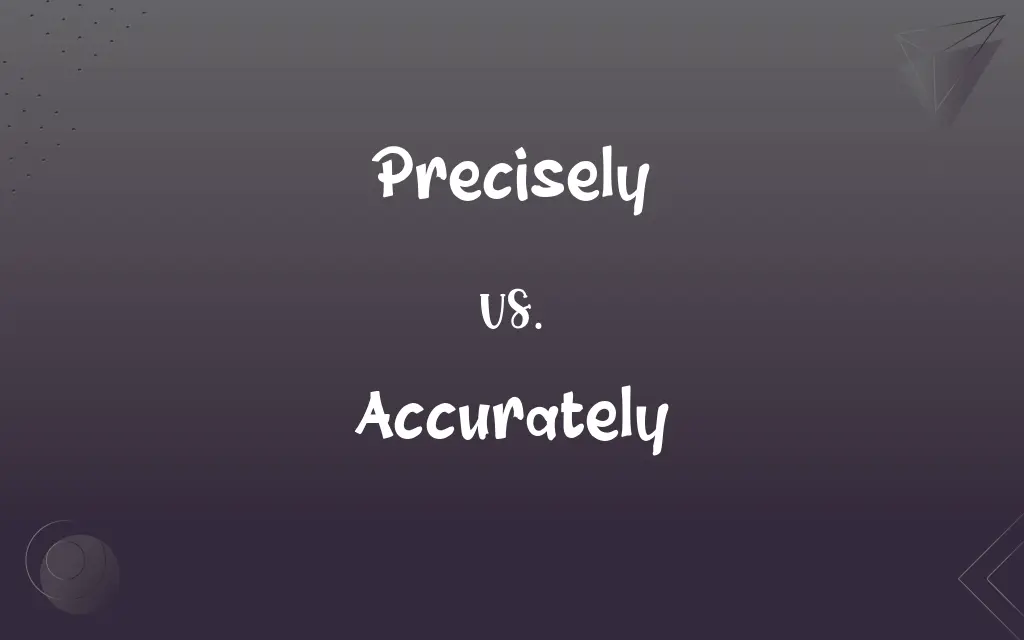Precisely vs. Accurately: What's the Difference?
Edited by Janet White || By Harlon Moss || Updated on November 3, 2023
Precisely refers to exactness in detail, whereas accurately means correct in all details.

Key Differences
Precisely indicates exactness and specific detail. It is used when the minutiae of information or action are of utmost importance. Precisely often refers to a finite point or a definitive position within a given context. Accurately, however, refers to the correctness and truth of an action or statement. When something is done accurately, it is free from errors, but it does not necessarily have to be as specific as when something is done precisely.
In measurement, doing something precisely means hitting the same mark consistently, even if it's not the correct one. For example, if a machine produces components that are precisely 5.03 inches each time, it is precise, regardless of whether 5.03 inches is the desired measurement. Doing something accurately means achieving the correct measurement, in this case, say 5 inches, even if there’s some variation in the results. Thus, accuracy aligns with correctness rather than the repeatability that precision implies.
When giving directions, one can be precise by providing the exact number of steps or turns, highlighting a meticulous level of detail. Being accurate in giving directions means ensuring the information leads to the correct destination, regardless of whether the details such as the number of steps are exact. Precisely details the "how" with specificity, while accurately ensures the "end result" is correct.
In communication, to convey a message precisely is to use the exact words without ambiguity or deviation, focusing on the clarity and exactness of expression. To convey a message accurately is to maintain the truthfulness and correctness of the information, ensuring the intended meaning is understood. Precision is about the fine-grained expression, whereas accuracy is about the fidelity of the content to reality or intention.
Thus, precisely and accurately, while often used interchangeably, serve different purposes in language. Precisely is about exactitude in execution or description, while accurately is about the correctness and truthfulness of an outcome or depiction. The choice between the two words hinges on whether the emphasis is on the strictness of detail or the veracity of the result.
ADVERTISEMENT
Comparison Chart
Definition
Exact, with meticulous detail.
Correct, true to a standard or fact.
Focus
Specificity and fine detail.
Correctness and truthfulness.
Context
Often used in contexts requiring exactitude.
Used where correctness is the goal.
Measurement
Emphasizes consistent exactness.
Emphasizes hitting the correct value.
Communication
Relates to the precision of words.
Relates to the correctness of information.
ADVERTISEMENT
Precisely and Accurately Definitions
Precisely
Exactly.
He cut the board precisely at six feet.
Accurately
Without errors.
He accurately described the suspect to the police.
Precisely
Specifically.
She followed the recipe precisely to avoid mistakes.
Accurately
Faithfully.
She accurately translated the text from French to English.
Precisely
With precision.
The clock is precisely synchronized with the atomic clock.
Accurately
Truthfully.
The witness accurately recounted the events of that night.
Precisely
Sharply defined.
He remembers precisely how the accident happened.
Accurately
Correctly.
The thermometer accurately measured the temperature.
Precisely
Meticulously.
The machine parts were assembled precisely.
Accurately
With exactness.
The archer accurately hit the target’s bullseye.
Precisely
In a precise manner.
Accurately
Conforming exactly to fact; errorless.
Precisely
Used as an intensive
Inferior equipment was precisely the reason some hikers refused to continue the climb.
FAQs
Does precisely mean the same as exactly?
Yes, precisely can be a synonym for exactly.
What does precisely mean in instructions?
It means follow the instructions with exact detail.
Can a statement be accurate but not precise?
Yes, if it’s correct overall but lacks specific detail.
Is accuracy important in reporting data?
Yes, data must be reported without errors to be reliable.
How does accuracy affect research outcomes?
Accuracy ensures research findings reflect the true results.
Does precise always mean correct?
No, precise refers to the detail, not necessarily correctness.
How do you measure precisely?
By using instruments that provide exact readings.
Can you be too precise?
Yes, if excessive detail is unnecessary and complicates understanding.
Can you use precisely for time?
Yes, like saying “at precisely 5 o’clock.”
How can one improve accuracy?
Through careful observation and verification of information.
Does precisely relate to clarity?
Yes, as it requires sharp definition and detail.
Can something be precisely wrong?
Yes, if it consistently hits the wrong mark with precision.
Can accuracy be quantified?
Yes, by comparing results to a known standard.
Does accurate measurement require calibration?
Yes, to ensure measurements align with standards.
Is it better to be precise or accurate?
It depends on the context and the desired outcome.
Does accurately imply honesty?
Yes, it implies truthfulness in representation.
Are there tools to measure precisely?
Yes, like calipers and micrometers.
What is the importance of precise language?
It provides clear communication without ambiguity.
Why is accuracy valued in science?
Because it ensures the correctness of scientific information.
How is accuracy checked?
By cross-referencing with correct or known values.
About Author
Written by
Harlon MossHarlon is a seasoned quality moderator and accomplished content writer for Difference Wiki. An alumnus of the prestigious University of California, he earned his degree in Computer Science. Leveraging his academic background, Harlon brings a meticulous and informed perspective to his work, ensuring content accuracy and excellence.
Edited by
Janet WhiteJanet White has been an esteemed writer and blogger for Difference Wiki. Holding a Master's degree in Science and Medical Journalism from the prestigious Boston University, she has consistently demonstrated her expertise and passion for her field. When she's not immersed in her work, Janet relishes her time exercising, delving into a good book, and cherishing moments with friends and family.































































